Key takeaways:
- Pro-life advocacy focuses on the inherent value of life and emphasizes empathy, community support, and open conversations to foster understanding.
- Building alliances within the pro-life movement enhances impact by combining unique strengths and creating a support network during challenges.
- Effective outreach involves crafting empathetic messages tailored to potential allies, using appropriate communication channels to foster genuine connections.
- Following up with allies strengthens relationships and keeps collaboration momentum alive, reinforcing shared goals and commitments.
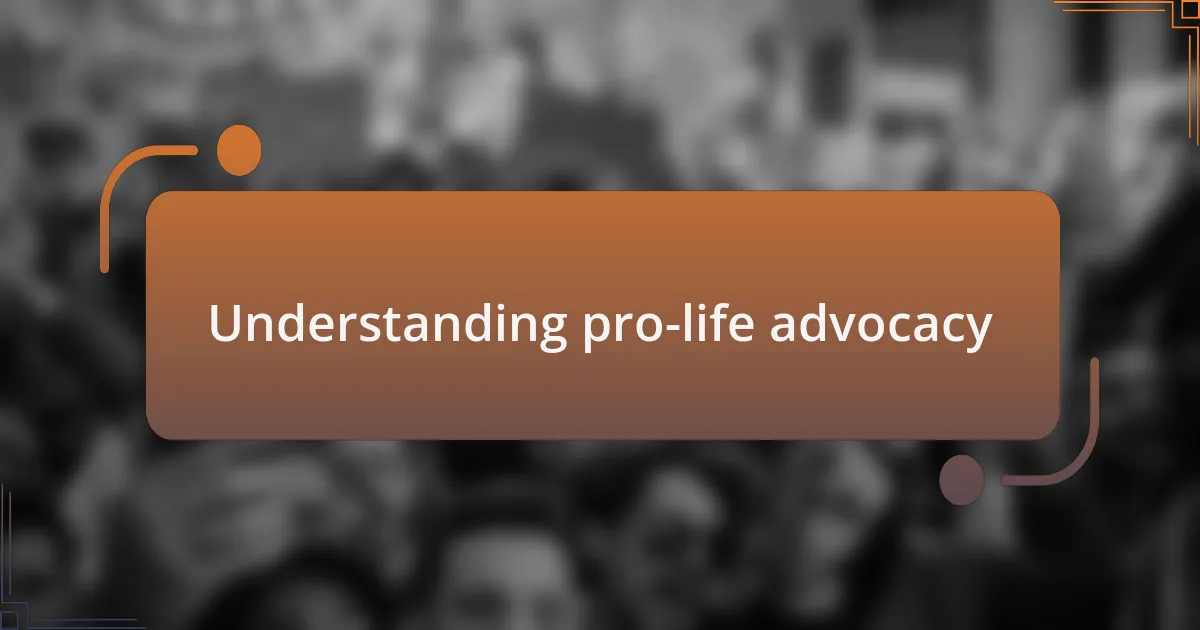
Understanding pro-life advocacy
Pro-life advocacy centers on the belief in the inherent value of every human life from conception to natural death. I remember the first time I truly felt the weight of this belief. I attended a rally where a mother shared her story about choosing life despite difficult circumstances. Listening to her, I realized that pro-life advocacy isn’t just about political stance; it’s about compassion, community, and understanding the personal struggles many face.
What strikes me most about pro-life advocacy is the fierce commitment to support alternatives to abortion, like adoption and social services. During my volunteer work at a crisis pregnancy center, I witnessed firsthand how providing resources and emotional support can transform lives. Have you ever considered how much empowerment comes from ensuring that every expectant mother feels she has options? It deepened my appreciation for the diverse strategies within our movement, aimed at fostering hope rather than despair.
At its core, pro-life advocacy is also about engaging in meaningful conversations that challenge societal norms and perceptions. I often think about how crucial it is to reach people with empathy rather than judgment. By sharing stories, like my experience speaking with individuals who felt pressured to choose abortion, we can change hearts and minds, fostering a culture that values every life deeply. How can we effectively use our voices to create that change? In my experience, listening is just as important as speaking out.
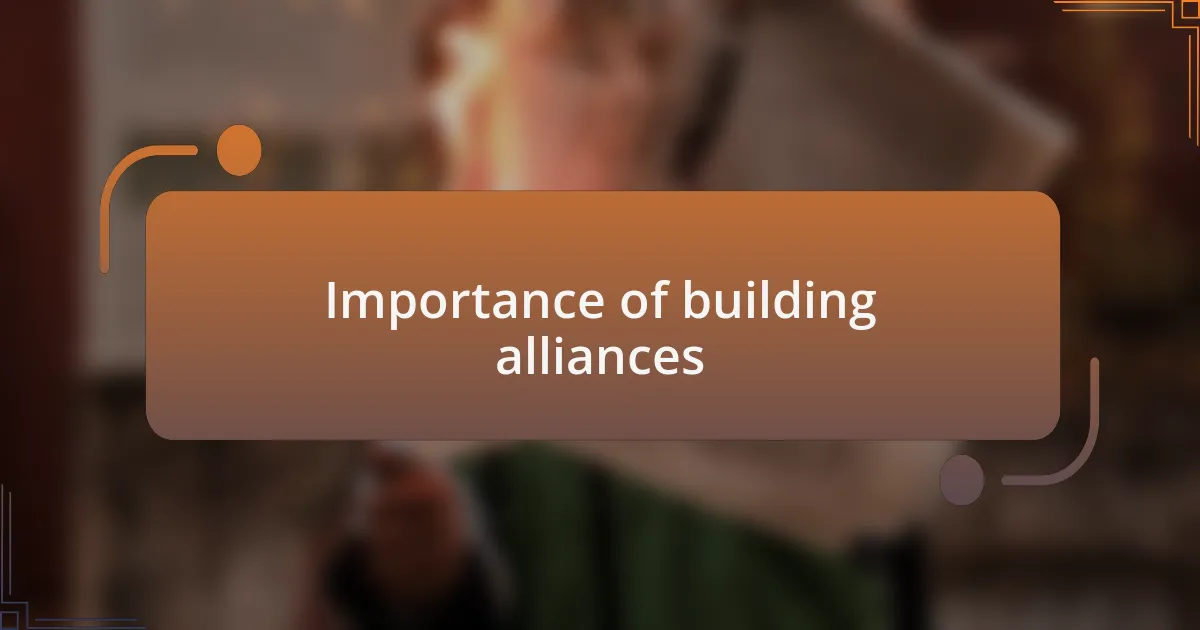
Importance of building alliances
Building alliances within the pro-life movement is essential for fostering a united front. I recall when I collaborated with different organizations for a community event. Each group brought unique strengths, from legal expertise to grassroots outreach. This kind of partnership not only magnified our impact but also broadened our understanding of the diverse challenges faced in advocacy.
Supporting one another creates a ripple effect that can lead to significant change. I remember chatting with a fellow advocate whose organization focused on educational initiatives. Hearing her passion inspired me to think creatively about our joint efforts. Have you ever noticed how collaborative projects can spark innovative solutions? It’s moments like these that remind me of the boundless potential when we align our resources and ideas.
Moreover, alliances can serve as a lifeline during tough times. I’ve found that having allies to lean on during setbacks can reignite motivation and confidence. For example, when facing opposition at public hearings, the support of a larger coalition made all the difference. How powerful is it to know you’re not alone in the trenches? This interconnectedness strengthens not just our message but also our resolve to advocate for every life.
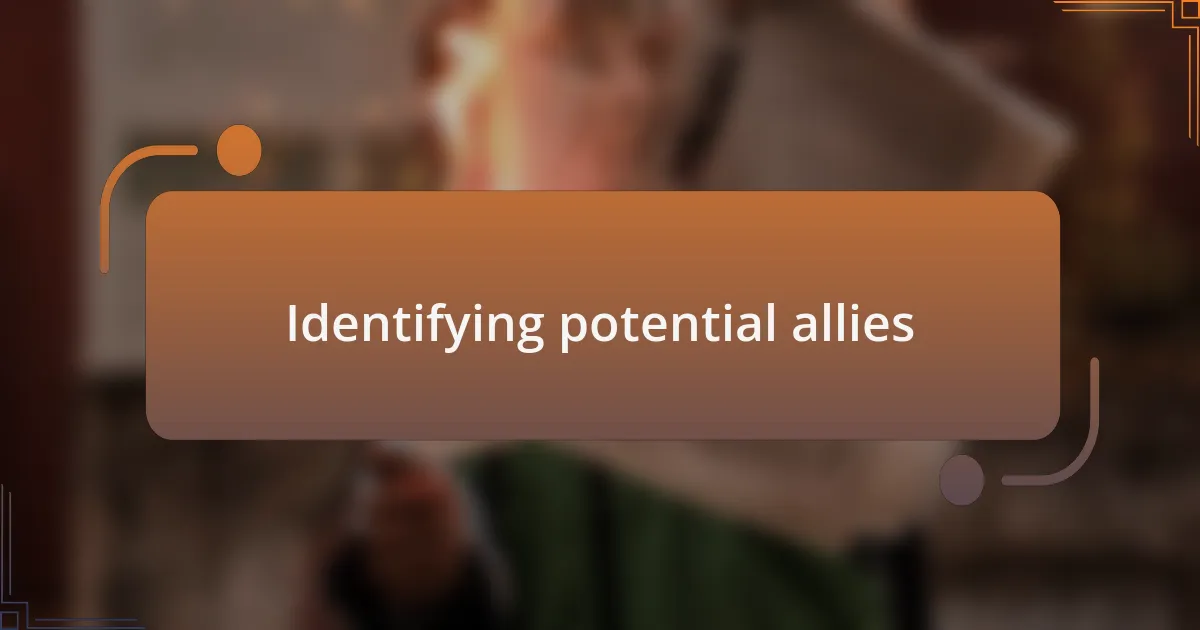
Identifying potential allies
When I began my journey in pro-life advocacy, identifying potential allies felt daunting. I started by reflecting on shared values and goals—who else is deeply committed to protecting life at all stages? In my experience, I found that local churches and community organizations often resonate with similar missions. This alignment can spark meaningful conversations that may lead to fruitful partnerships.
Networking at events has also proven invaluable. I vividly recall attending a conference dedicated to family advocacy. While mingling, I discovered fellow pro-life activists who had unique perspectives and resources. It was in these informal settings that I learned the power of asking questions. Have you ever approached someone just to understand their vision? That openness helped me identify allies I would later collaborate with on impactful projects.
Another effective strategy I’ve used is reaching out through social media. I started following organizations and individuals who consistently share insights on pro-life issues. By engaging with their content and showing genuine interest in their initiatives, I laid the groundwork for future conversations. Pursuing these connections has enriched my advocacy journey, reminding me that the right allies are often just a conversation away.
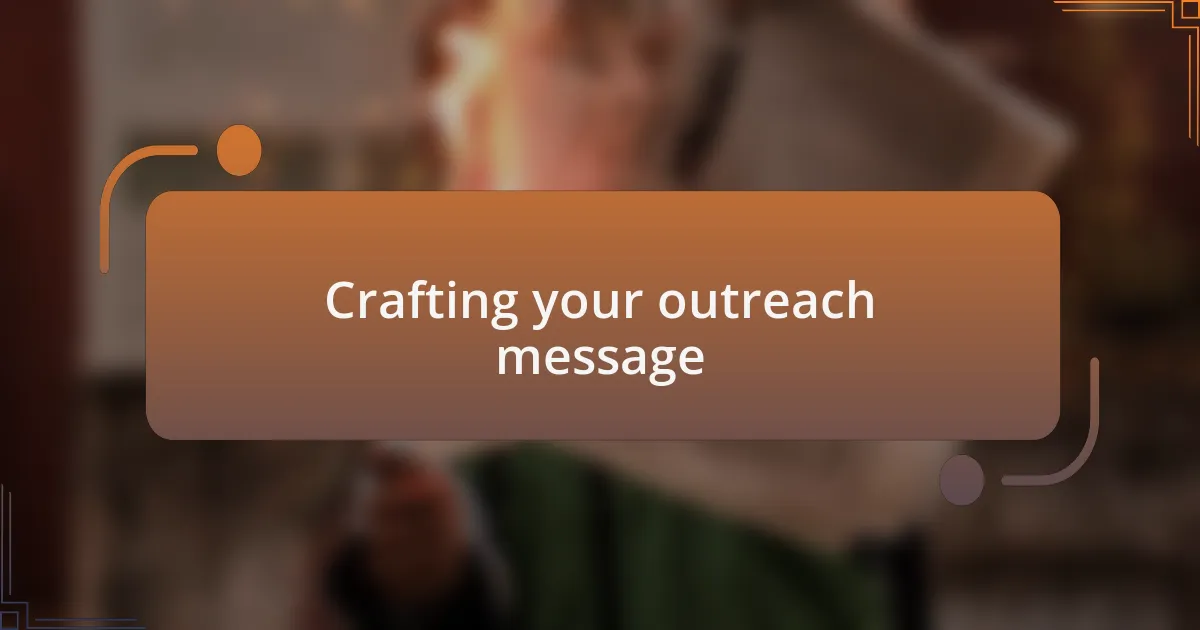
Crafting your outreach message
Crafting your outreach message begins with empathy. When I compose messages to potential allies, I focus on their values and passions, much like a friend sharing news that could resonate deeply. For instance, I once reached out to a local organization advocating for children’s welfare. I started my message by acknowledging their hard work and expressing a shared commitment to life. This approach opened doors, as it demonstrated genuine understanding and mutual respect right from the start.
Words matter, and I’ve learned that clarity is crucial. One day, while crafting a message for an upcoming fundraiser, I made a point to explain exactly why their involvement could make a difference. I highlighted the powerful impact we could create together—after all, who wouldn’t want to be part of something that saves lives? In crafting messages that articulate not just a call to action but a shared vision, I found that allies were more inclined to respond positively.
Don’t shy away from vulnerability in your outreach. I remember one emotional appeal I made to a potential partner, sharing my personal journey and the profound moments that led me to advocacy. I asked them how their experiences shaped their views. Including such personal touches invites a deeper connection, inviting allies into a shared narrative rather than a transactional discussion. Reflecting on those past exchanges has shown me that an outreach message can be a profound bridge, connecting hearts and minds for a common cause.
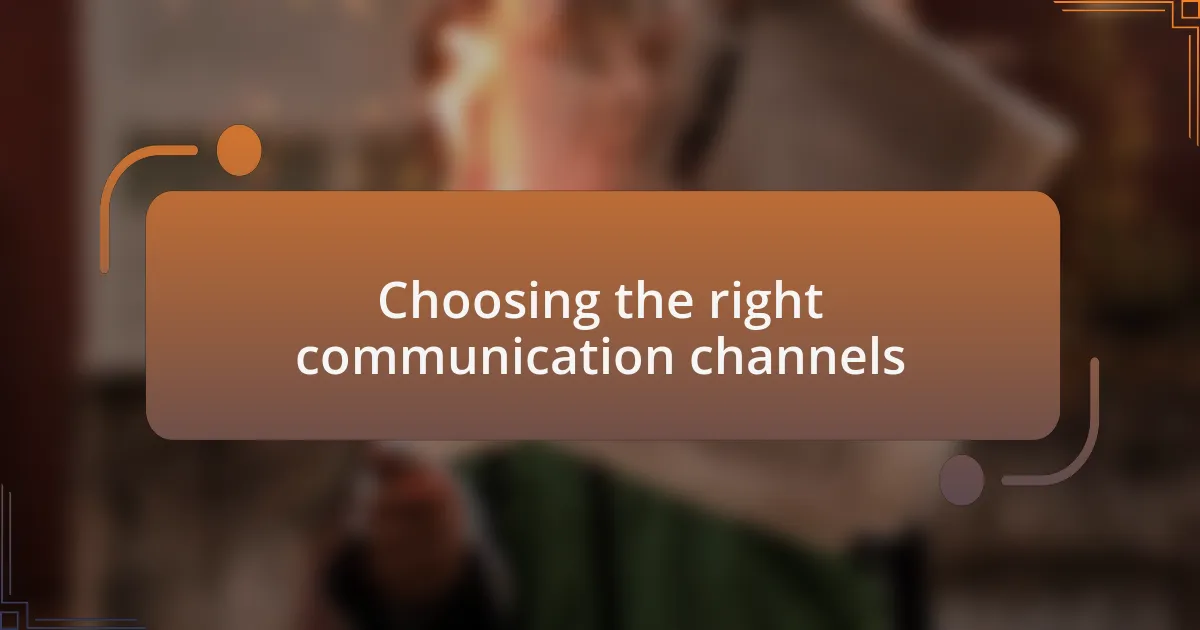
Choosing the right communication channels
When it comes to reaching out to allies, choosing the right communication channel can significantly influence the success of your message. I’ve found that knowing your audience is key. For example, while preparing to connect with a national pro-life group, I opted for a personal phone call rather than an email. This direct approach created an immediate connection, allowing us to engage in an authentic conversation about our shared mission. Have you ever noticed how tone and body language can shape a discussion? That’s what I experienced making that call; it turned a simple outreach into a heartfelt dialogue.
Sometimes, I turn to social media as a tool for outreach, especially when trying to connect with younger advocates. I once posted a thought-provoking question on a platform where I knew many of my peers gathered. It sparked a lively discussion, leading to direct messages from individuals eager to explore collaboration. This casual setting not only felt more approachable but also invited genuine conversations that could lead to powerful partnerships. Can you imagine the synergy that unfolds when like-minded people engage openly?
In my experience, traditional methods still hold value. I often send handwritten notes to local leaders, emphasizing the personal touch it conveys. One time, a simple note led to an invitation to present at a community event. It’s a reminder that while digital tools are convenient, sometimes the most sincere gestures make the strongest impact. Do you think a simple piece of paper can forge a connection that feels more lasting? I certainly believe it can, and I’ve seen it work firsthand.
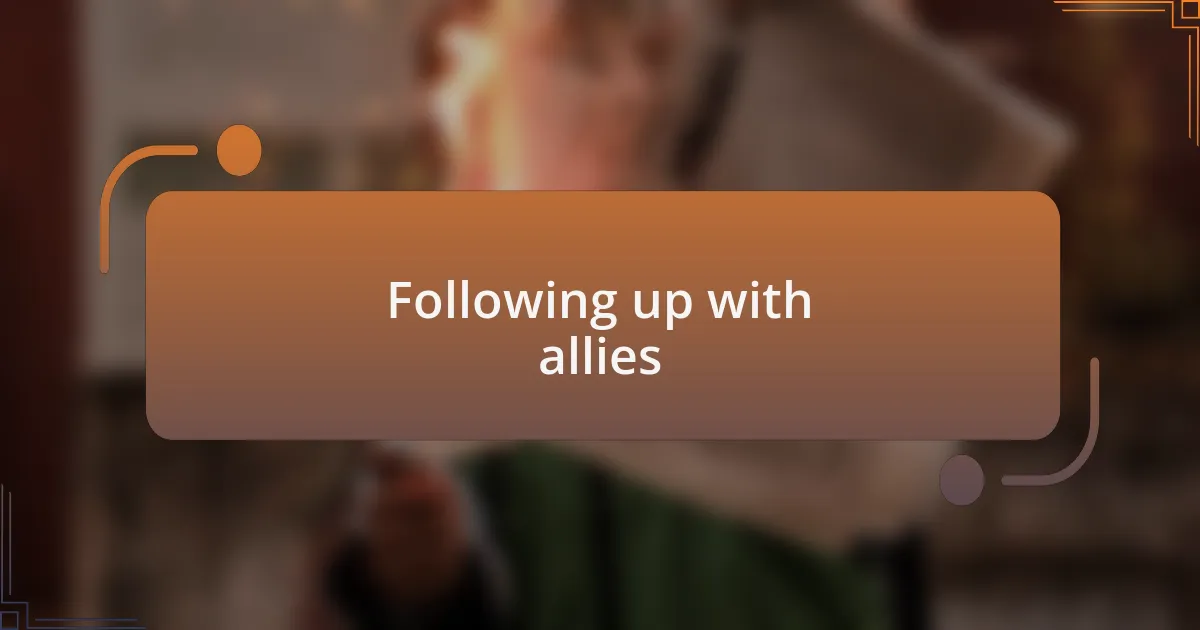
Following up with allies
Following up with allies is essential in nurturing those connections. I remember reaching out to a friend after an initially engaging meeting. I sent a follow-up message, not just to thank them, but to share an article related to our discussion. Their response was enthusiastic, and it rekindled our conversation about potential collaborations. That simple gesture reinforced our bond and emphasized that I value their insights.
There was a time when I organized a small lunch with several local groups after an initial outreach effort. The follow-up was critical; I wanted to delve deeper into how we could support each other. During the lunch, I focused on listening to their challenges, which created a relaxed atmosphere for sharing ideas. It struck me how effective a face-to-face interaction can be in reaffirming our collective goals. Do you think that personal touch can make alliances stronger? From my experience, it certainly can.
I often use follow-up emails as a tool to keep the momentum going. After each encounter, I make it a point to summarize our discussion and outline next steps. Once, after contacting a nearby university’s pro-life club, I highlighted key points we agreed upon. This simple follow-up kept us aligned and motivated to move forward. How often do we let great conversations fade away without a reminder? I believe that reiterating our commitment can truly make a difference in keeping the flame of collaboration alive.
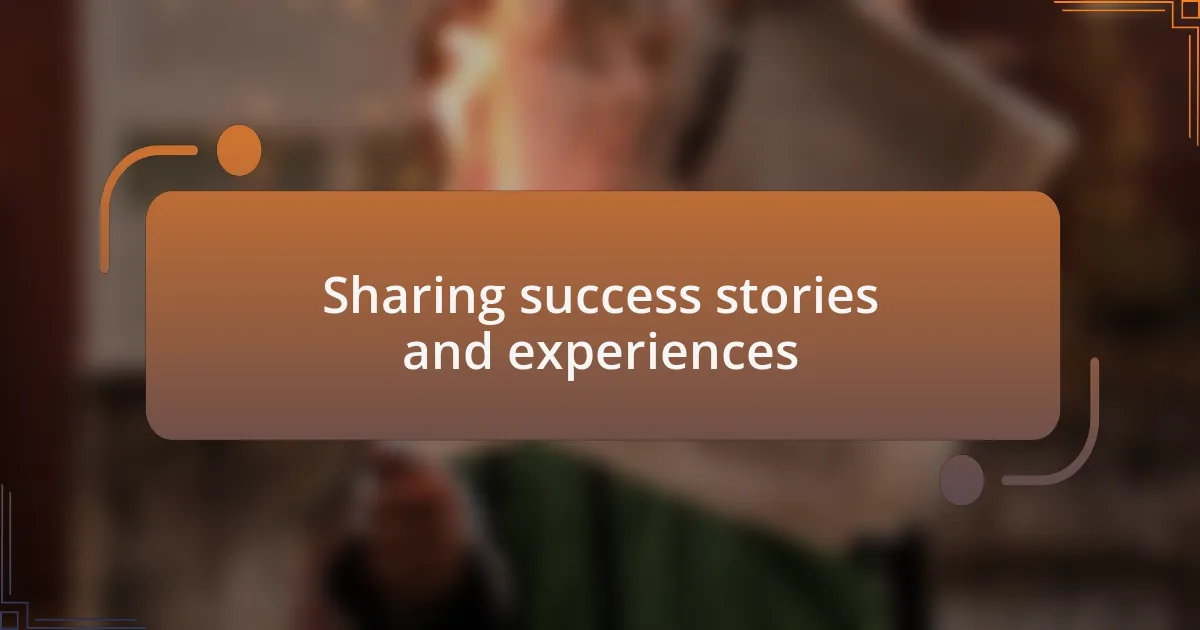
Sharing success stories and experiences
Sharing success stories creates a sense of community among pro-life advocates. I vividly recall a gathering where one member shared her story about organizing a successful awareness campaign at her university. The pride in her voice was palpable, igniting inspiration in all of us. It made me reflect on how sharing our wins, regardless of their size, can encourage others to take similar steps.
I once participated in an online forum where individuals shared their triumphs in reaching out to local legislators. One particular story stood out—a young advocate had managed to secure a meeting with her state representative. Hearing her describe how nervous yet determined she felt made me realize that vulnerability can be a powerful catalyst for motivation. Have you ever felt that surge of confidence when you witnessed someone else achieve something similar? For me, it’s a reminder that we’re all in this together, learning from one another along the way.
Additionally, I make it a point to celebrate milestones in our monthly newsletters. Highlighting success stories not only honors the hard work of my fellow advocates but also demonstrates that progress is possible. I remember including a feature about a local group that successfully hosted a fundraising event, and the responses were overwhelmingly positive. It struck me how sharing these experiences not only uplifts those directly involved but also sparks new ideas in others. Isn’t it fascinating how one person’s journey can inspire an entire community to take action?